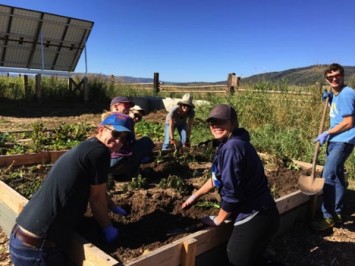Hope and Agency as Ontological Imperatives for Sustainability Education: An Introduction to the Special Issue of the Journal of Sustainability Education Focused on Hope and Agency
 Evans Overview JSE Nov 2015 Hope Issue PDF
Evans Overview JSE Nov 2015 Hope Issue PDF
Abstract: Offers a brief introduction to the Journal of Sustainability Education issue focused on hope and agency, highlighting hope and agency as essential aspects of sustainability education in the Anthropocene.
Keywords: hope, agency, pedagogy, teaching, learning, Anthropocene
While I certainly cannot ignore hopelessness as a concrete entity, nor turn a blind eye to the historical, economic, and social reasons that explain that hopelessness – I do not understand human existence, and the struggle needed to improve it, apart from hope and dream. Hope is an ontological need. Hopelessness is but hope that has lost its bearings, and become a distortion of that ontological need…. When it becomes a program, hopelessness paralyzes us, immobilizes us. We succumb to fatalism, and then it becomes impossible to muster the strength we absolutely need for a fierce struggle that will re-create the world.
—Paulo Freire (1994/2014, p. 2)
A Shared Vision
Co-creating this journal issue focused on hope and agency in sustainability education has been an incredible journey. In gathering the material for this issue, we have arrived at a vantage point for a shared vision of hope and agency as essential aspects and outgrowths of sustainability education. As many of the authors whose work is included here indicate, hope, paired with agency, is an essential foundation for transformative learning. As Freire (1994/2014) notes, hope is an “ontological need” (p. 2) for humanity in the troubled modern era – and therefore for education appropriate to addressing the converging crises of the Anthropocene. As we see from the perspectives of many contributors to this issue, fostering in-depth understanding and much needed empathy in sustainability education serves as an animating force for clear-eyed, engaged hope-in-action: for the efficacious agency so needed in our world today.
An Ongoing Conversation in Words and Deeds
Hope, as an ontological need demands an anchoring in practice…. Hope needs practice in order to become historical concreteness.
—Paulo Freire (1994/2014, p. 2)
One of the tasks of the progressive educator, through a serious, correct political analysis, is to unveil opportunities for hope, no matter what the obstacles may be.
—Paulo Freire (1994/2014, p. 3)
Our work as progressive educators directly engages with our ontological need for hope (Freire, 1994/2014, p. 2) and ignites the transformative capacities of our students to engage in concrete expressions of our collective calling: to make sustainability both understood and real. I hope you enjoy the articles included in this issue and find them to be both inspirational and practical for your sustainability education work. It is, after all, in the carrying forward of the ideas, experiences, and research shared here that the conversation sparked in this issue continues in words and deeds, making hope and agency tangible realities in our our communities and the wider world.
Gratitude
I would like to thank the current and past members of the Hope an Agency Research Collaborative whose work served as a kernel that grew into this issue of the JSE: Lee Ball, Jordana DeZeeuw Spencer, Rachel Forbes, Marna Hauk, Richard Kahn, and Denise Mitten. I would also like to express my deep thanks to all of the contributing authors to this issue whose work inspires me. These leaders and educators are bringing hope and agency to the forefront of sustainability education, and I thank them for sharing their experiences, perspectives, research, and ideas as contributions to the ongoing conversation about the roles of hope and agency in sustainability education. Marna Hauk deserves special thanks for assisting with developing the vision for this issue, for recruiting contributions, and for contributing heavily to the larger editorial process by serving as Assistant Guest Editor. I would also like to thank the editorial team at the JSE for their essential help with the many technical and managerial processes of bringing this issue to completion. JSE Editor, Clare Hintz and Jennifer Mason deserve special recognition for these important efforts. Lastly, and most importantly, I would like to thank you, the JSE readers, for engaging in our shared work.
References
Freire P. (1994/2014). Pedagogy of hope: Reliving Pedagogy of the Oppressed. London: Bloomsbury.










 Tina Lynn Evans, Ph.D., is Associate Professor of Sustainability Studies at Colorado Mountain College and author of the book Occupy Education: Living and Learning Sustainability (2012, Peter Lang). Her articles on sustainability, sustainability education, and transdisciplinary theory and practice are available via her Academia.edu site. Evans is a founder and member of the advisory board for the Journal of Sustainability Education. She lives in Steamboat Springs, Colorado, where she engages with students and community members in praxis toward sustainability-oriented social change. Contact: tevans@coloradomtn.edu.
Tina Lynn Evans, Ph.D., is Associate Professor of Sustainability Studies at Colorado Mountain College and author of the book Occupy Education: Living and Learning Sustainability (2012, Peter Lang). Her articles on sustainability, sustainability education, and transdisciplinary theory and practice are available via her Academia.edu site. Evans is a founder and member of the advisory board for the Journal of Sustainability Education. She lives in Steamboat Springs, Colorado, where she engages with students and community members in praxis toward sustainability-oriented social change. Contact: tevans@coloradomtn.edu. 
